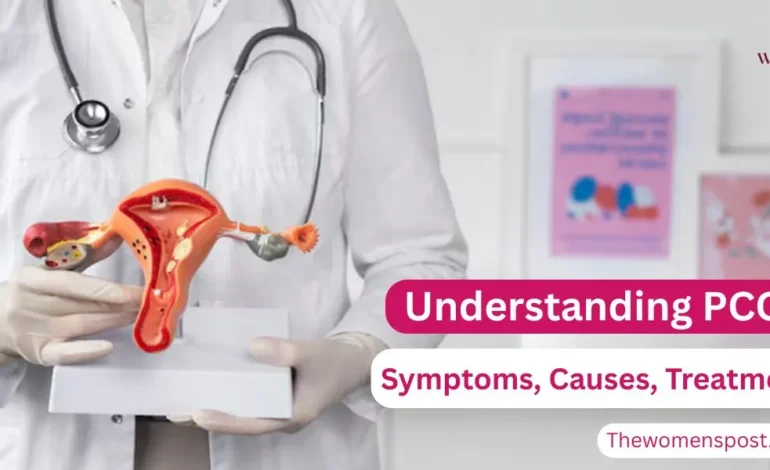Understanding PCOS: Symptoms, Causes, Treatment & How Women Can Take Control

Polycystic Ovary Syndrome (PCOS) is one of the most common yet underdiagnosed hormonal disorders affecting women of reproductive age. Despite its prevalence, PCOS often goes undetected for years, leading to physical, emotional, and metabolic complications. This article explores everything you need to know about Polycystic Ovary Syndrome—from its symptoms and causes to how women can manage and overcome its challenges.
What is Polycystic Ovary Syndrome (PCOS)?

Also Read: Food Sustainability Leader Changing Food Systems: Iseult Ward
Polycystic Ovary Syndrome is a chronic condition where the ovaries produce higher-than-normal levels of male hormones (androgens), causing a disruption in the menstrual cycle and leading to the development of small cysts in the ovaries. However, having cysts isn’t necessary for a PCOS diagnosis.
The condition affects nearly 1 in 10 women globally and is a leading cause of infertility, acne, weight gain, and menstrual irregularities.
What Are the Early Signs of PCOS in Women?
Recognizing the early signs of PCOS is crucial for timely intervention. These may include:
- Irregular or missed periods
- Heavy menstrual bleeding
- Painful periods or cramping
- Excess facial and body hair (hirsutism)
- Severe acne and oily skin
- Thinning hair or hair loss
- Unexplained weight gain
Symptoms of PCOS and weight gain often go hand in hand due to insulin resistance, which is a hallmark of the condition.
Also Read: Nadya Okamoto: A Warrior Against Period Poverty
Causes of PCOS
The causes of PCOS are multifactorial, involving a mix of genetic, hormonal, and environmental triggers:
- Insulin resistance – Triggers the ovaries to produce more androgens
- Hormonal imbalance – Elevated testosterone disrupts ovulation and menstrual regularity
- Genetics – PCOS tends to run in families
- Low-grade inflammation – Can stimulate ovarian androgen production
Understanding the causes of PCOS helps in building effective prevention and treatment strategies.
PCOS Diagnosis: How Is It Done?
Accurate PCOS diagnosis involves a combination of:
- A thorough medical history and symptom checklist
- Blood tests to measure hormone levels
- Pelvic ultrasound to detect ovarian cysts
- Rule-out tests for thyroid disorders or other hormonal issues
Doctors typically follow the Rotterdam Criteria, where two of the following must be present: irregular ovulation, excess androgen levels, or cystic ovaries.
Treatment for PCOS: What Are Your Options?

Also Read: The Hidden Victims of Climate Change: Women in Vulnerable Communities
Though PCOS cannot be fully cured, the condition is highly manageable. A comprehensive treatment for PCOS usually involves both medical and holistic approaches.
Managing PCOS Naturally
- Healthy eating habits – Focus on diet tips for women with PCOS, including high-fiber vegetables, whole grains, lean protein, and low-GI foods
- Regular exercise – Enhances insulin sensitivity and reduces inflammation
- Stress reduction – Mindfulness, yoga, and sleep hygiene help regulate hormones
If you’re wondering how to manage PCOS with lifestyle changes, consistency is key. Even a modest weight loss of 5-10% can restore ovulation and improve fertility.
Medical Treatment for PCOS
- Hormonal contraceptives – Help regulate periods and reduce acne and excess hair
- Metformin – Improves insulin sensitivity, especially in women struggling with weight gain
- Anti-androgens – Help lower male hormone levels and combat acne and hirsutism
- Fertility drugs – Like Clomid or Letrozole, used when pregnancy is desired
Women often ask, can PCOS be cured naturally? While there’s no definitive cure, natural management strategies combined with medical guidance can significantly reduce symptoms.
Emotional and Mental Health Impact
Polycystic Ovary Syndrome affects not just the body but also the mind:
- High risk of anxiety and depression
- Body image issues due to weight, acne, or hair growth
- Emotional stress related to infertility or irregular cycles
Platforms like TheWomensPost are working to raise awareness and foster support communities for women dealing with PCOS.
Long-Term Health Risks Linked to PCOS

Also Read: Balancing Motherhood and Career: The Need for Better Maternity Leave and Flexible Work Policies
If not managed properly, PCOS can lead to:
- Type 2 diabetes
- Cardiovascular disease
- High cholesterol
- Endometrial cancer
- Sleep apnea
- Infertility
This makes early PCOS diagnosis and proactive management vital.
Lifestyle Changes: A Path Toward Healing
Lifestyle changes are not just supportive—they’re transformative. Whether it’s switching to an anti-inflammatory diet, adopting a regular workout routine, or focusing on mental wellness, these shifts can ease symptoms and reduce dependency on medication.
For women wondering how to manage PCOS with lifestyle changes, the answer lies in a personalized and sustainable plan that addresses diet, exercise, and emotional well-being.
Final Thoughts
Polycystic Ovary Syndrome is a multifaceted condition—but with the right knowledge and action, it doesn’t have to be life-limiting. Whether you’re newly diagnosed or seeking better ways to cope, remember that managing PCOS naturally is possible when paired with professional care and consistent effort.
Raising awareness through platforms like TheWomensPost can empower more women to seek help, make informed decisions, and thrive in spite of PCOS.
Frequently Asked Questions (FAQs)
1. What are the early signs of PCOS in women?
Some of the early signs of Polycystic Ovary Syndrome include irregular or missed periods, unexplained weight gain, excessive facial or body hair, acne, and thinning scalp hair. Recognizing these symptoms early is essential for timely PCOS diagnosis and management.
2. What causes PCOS?
The causes of PCOS are not fully understood, but they often include a combination of insulin resistance, hormonal imbalance, genetic predisposition, and low-grade inflammation. These factors contribute to irregular ovulation and elevated androgen levels.
3. Can PCOS be cured naturally?
There is no known cure for PCOS, but many women successfully manage their symptoms naturally through lifestyle changes such as a balanced diet, regular exercise, stress management, and weight control. Managing PCOS naturally can significantly improve hormone levels and menstrual regularity.
4. What are the best treatment options for PCOS?
Treatment for PCOS varies based on individual symptoms and goals. It may include hormonal birth control, insulin-sensitizing medications like Metformin, anti-androgens, and fertility drugs. Complementing medical treatment with lifestyle changes can enhance outcomes.
5. How can I manage PCOS with lifestyle changes?
You can manage PCOS by maintaining a healthy weight, following a low-GI and anti-inflammatory diet, exercising regularly, and managing stress. Diet tips for women with PCOS include avoiding processed foods and sugars and focusing on high-fiber vegetables, lean proteins, and healthy fats.









